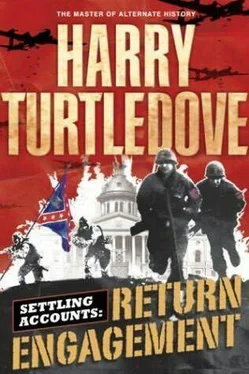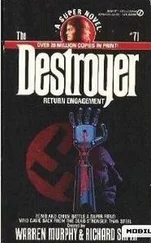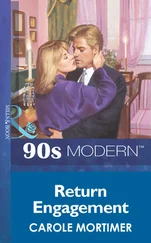Harry Turtledove - Return engagement
Здесь есть возможность читать онлайн «Harry Turtledove - Return engagement» весь текст электронной книги совершенно бесплатно (целиком полную версию без сокращений). В некоторых случаях можно слушать аудио, скачать через торрент в формате fb2 и присутствует краткое содержание. Жанр: История, на английском языке. Описание произведения, (предисловие) а так же отзывы посетителей доступны на портале библиотеки ЛибКат.
- Название:Return engagement
- Автор:
- Жанр:
- Год:неизвестен
- ISBN:нет данных
- Рейтинг книги:5 / 5. Голосов: 1
-
Избранное:Добавить в избранное
- Отзывы:
-
Ваша оценка:
- 100
- 1
- 2
- 3
- 4
- 5
Return engagement: краткое содержание, описание и аннотация
Предлагаем к чтению аннотацию, описание, краткое содержание или предисловие (зависит от того, что написал сам автор книги «Return engagement»). Если вы не нашли необходимую информацию о книге — напишите в комментариях, мы постараемся отыскать её.
Return engagement — читать онлайн бесплатно полную книгу (весь текст) целиком
Ниже представлен текст книги, разбитый по страницам. Система сохранения места последней прочитанной страницы, позволяет с удобством читать онлайн бесплатно книгу «Return engagement», без необходимости каждый раз заново искать на чём Вы остановились. Поставьте закладку, и сможете в любой момент перейти на страницу, на которой закончили чтение.
Интервал:
Закладка:
He couldn't see more than a couple of his barrels. They waited behind garages and in hedgerows and hull-down behind little swells of ground. All of them had secondary and tertiary positions to which they could fall back in a hurry. Morrell didn't like standing on the defensive. He would much rather have attacked. He didn't have the muscle to do it. If he was going to defend, he'd do the best job he could. Nothing comes cheap-that was his motto.
A soldier in green-gray came pelting up a driveway toward him. "They're heading this way, sir!" he called.
"Give me today's recognition signal," Morrell said coldly.
"Uh, hamster-underground," this man said.
"All right. Tell me more." The Confederates had no trouble getting hold of U.S. uniforms. They didn't have much trouble finding men whose drawls weren't too thick. Add those two together and they'd made a couple of holes for themselves where none had been before, simply by telling the right lie at the right time. That made U.S. officers leery about trusting men they didn't know by sight.
With luck, U.S. soldiers in butternut were also confusing the enemy. Both sides had used such dirty tricks in the last war. They both seemed much more earnest about them this time around.
The man in green-gray pointed southwest. "Barrels kicking up dust, sir. You'll see 'em yourself pretty soon. And infantrymen moving up with 'em, some on foot, some in trucks."
"How many barrels?" Morrell asked. He worried about the Confederate soldiers in trucks, too. This war was being fought at a pace faster than men could march. The CSA seemed to understand that better than his own side did.
"Don't know for sure, sir," the man answered. Was he really a U.S. soldier? The Confederates could have wrung the signal out of a prisoner. He went on, "Looked like a good many, though."
Artillery started coming in out of the south. That argued the fellow was telling the truth. Morrell hoped all the civilians were out of Plain City. Artillery killed.
Up ahead, machine guns started rattling. They sealed the messenger's truth for Morrell. Up there, grizzled noncoms would be teaching their younger disciples the mysteries of the two-inch tap, mysteries into which they themselves had been initiated during the last war. Tap the side of the weapon so that it swung two inches to right or left, keep tapping back and forth through its whole arc of fire, and it would spit out a stream of bullets thick enough that advancing against it was death for foot soldiers.
Small-arms fire answered the machine guns. But it was not small-arms fire of the sort Morrell had heard in the Great War, not the steady pop-pop-pop! that came from bolt-action rifles. These stuttering bursts were like snippets of machine-gun fire themselves. Some of the Confederates had submachine guns, whose racket was relatively weak and thin. But others carried those damned automatic rifles that were young machine guns in their own right.
And here came the Confederate barrels. The lead machines did what they were supposed to do: they stopped and began taking out the U.S. machine-gun nests. Once those were silenced, the infantry could go forward without being bled white. But the Confederates didn't seem to suspect U.S. barrels were in the neighborhood. Stopping to fire gave irresistibly tempting targets.
"Pick your pleasure, Sergeant Pound," Morrell said with an odd, joyous formality.
"Yes, sir." Pound traversed the turret, peered through the rangefinder, and turned a crank to elevate the gun ever so slightly. He barked a hyphenated word at the loader: "Armor-piercing!"
"Armor-piercing!" Sweeney set a black-tipped shell in the breech; high-explosive rounds had white tips.
Pound fired. The gun recoiled. The roar, Morrell knew, was softer inside the turret than it would have been if he had his head out the cupola. He coughed at the cordite fumes.
"Hit!" Pound shouted, and everyone in the crowded turret cheered and slapped everyone else on the back. Morrell popped up like a jack-in-the-box to get a better look at what was going on. Three Confederate barrels were burning. Men were bailing out of one, and U.S. machine-gun and rifle fire was cutting them down. The poor bastards in the other two barrels never had even that much chance to get away.
Now the C.S. barrel crews knew they weren't facing infantry alone. They did what Morrell would have done had he commanded them: they spread out and charged forward at top speed. A moving target was a tough target. And they had, however painfully, developed the U.S. position: now they knew where some of their assailants hid. A glancing blow from a shell made one of them throw a track. It slewed sideways and stopped, out of the fight. The rest came on.
Sergeant Pound fired twice in quick succession. The first round set a barrel on fire. The second missed. The Confederates started shooting back. A U.S. barrel brewed up. Ammunition exploded inside the turret. An enormous and horribly perfect smoke ring rose from what must have been the open cupola. Morrell hoped the men inside the barrel hadn't known what hit them.
He got on the wireless to his machines: "Fall back to your second prepared positions now!" He didn't want the Confederates outflanking his barrels, and he didn't want them concentrating their fire on the same places for very long, either.
His own barrel retreated with the rest. The second prepared position was under a willow tree that made the great steel behemoth next to invisible from any distance. He wished he could have offered more support to the foot soldiers, but his main task was to keep the Confederate barrels on this side of Big Darby Creek.
Sergeant Pound fired again. He swore instead of whooping: a miss. And then, as much out of the blue as a sucker punch in a bar fight, a shell slammed into Morrell's barrel.
The front glacis plate almost kept the round out-almost, but not quite. The driver and the bow machine gunner took the brunt of the hardened steel projectile. They screamed, but not for long. The loader likewise howled as the round smashed his leg before crashing through the ammunition rack-luckily, through a slot without a shell in it-and into the engine.
As smoke and flame began filling the turret, Morrell threw open the cupola. "Out!" he shouted to Pound. "I'll give you a hand with Sweeney."
"Right you are, sir," the gunner said, and then, to the loader, "Don't worry. It will be all right."
"My ass," Sweeney ground out.
They got him and themselves out of the barrel before ammunition started cooking off. One look at his leg told Morrell he'd lose it-below the knee, which was better than above, but a long way from good. A tourniquet, a dusting of sulfa powder, and a shot of morphine were all Morrell could do for him. He shouted for medical corpsmen. They took the wounded man away.
"Now we have to get out of this ourselves. That could be interesting." Michael Pound sounded more intrigued than alarmed.
U.S. barrels were falling back towards and then across the ford over Big Darby Creek. The Confederates pressed them hard. Morrell would have done the same thing. It might cost a few more casualties now, but the rewards were likely to be worth it.
The two barrel men splashed through the creek. A Confederate barrel whose machine gun was swinging their way took a round in the flank and caught fire. The crew lost interest in them and started bailing out. Morrell and Pound made it across and into the bushes on the far side. For the time being, the Confederates couldn't force a crossing here. But Morrell wondered how long that would last and whether they could get over the creek somewhere else.
Major Jonathan Moss was not the man he had been half a lifetime ago, not the bright young flying officer who'd gone into the Great War all bold and brave and chivalrous. The desperate campaign in the skies above Ohio and Indiana rubbed his nose in that.
Читать дальшеИнтервал:
Закладка:
Похожие книги на «Return engagement»
Представляем Вашему вниманию похожие книги на «Return engagement» списком для выбора. Мы отобрали схожую по названию и смыслу литературу в надежде предоставить читателям больше вариантов отыскать новые, интересные, ещё непрочитанные произведения.
Обсуждение, отзывы о книге «Return engagement» и просто собственные мнения читателей. Оставьте ваши комментарии, напишите, что Вы думаете о произведении, его смысле или главных героях. Укажите что конкретно понравилось, а что нет, и почему Вы так считаете.












